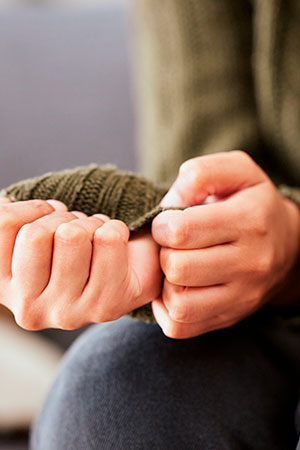
You walked into your first therapy session with hope. Maybe you’d been carrying pain for months or years, and decided to seek help. You expected to feel relief, clarity, or at least some lightness after unburdening yourself to a professional.
Instead, you left feeling raw, exposed, and somehow more unsettled than when you arrived.
Three weeks in, you’re questioning whether therapy is actually helping. Your emotions feel bigger, messier, and more unpredictable. You’re crying more often. Sleep feels elusive. That persistent anxiety you thought would start melting away seems to have intensified.
You wonder if you’ve made a mistake.
What you’re experiencing isn’t a sign that therapy is failing you. It’s often a sign that it’s working. Data shows that 75 percent who enter psychotherapy will benefit from it. However, the uncomfortable truth about healing is that it rarely follows the neat, upward trajectory we imagine. Real recovery looks more like carefully opening a door you’ve kept sealed for years, only to find everything you’ve been trying not to feel waiting on the other side.
When Safety Creates Space for What You’ve Been Avoiding
Think about what happens when you get home after holding yourself together through a hard day. The moment you close your front door, the tears you’ve been fighting suddenly spill over.
Your body recognizes safety, and everything you’ve been suppressing rushes to the surface.
Therapy creates the same sanctuary, though for emotions you may have been suppressing for much longer. Your therapist’s office becomes that rare space where your defenses can relax. The protective walls you’ve built around old wounds start to soften, and the pain underneath begins to emerge.
The process can feel counterintuitive and frightening. You came to therapy to feel better, not to feel everything more intensely. Those walls served an important purpose when you built them, helping you survive when you didn’t have other options.
Now, in the safety of the therapeutic relationship, your mind is willing to let you feel what you couldn’t feel then.
The Strange Territory Between Awareness and Change
As weeks pass, something else happens that can feel equally disorienting. You start noticing patterns you’ve never seen before. You recognize how your childhood affects your relationships. You see the ways you’ve been protecting yourself that no longer serve you.
Yet awareness comes before change.
There’s often a gap between recognizing something and knowing what to do about it. During these weeks, you walk around feeling like you’re missing a layer of skin. Everything feels too bright, too loud, too much. You’re seeing clearly for the first time, yet you haven’t developed the skills to handle what you’re seeing.
The phase can be particularly unsettling because you feel like you’re regressing. Maybe you thought you’d moved past certain issues, only to find them surfacing with renewed intensity. You question your progress, wondering if all that work you thought you’d done was somehow imaginary.
It wasn’t. What’s happening is that you’re strong enough now, safe enough now, to face things you couldn’t face before.
So when these old feelings resurface with new intensity, it’s not because you’re going backward. It’s because you’re ready to go deeper.
What All of These Changes Look Like in Real Life
Unexpected tears become common. A commercial, a song, even a random memory can trigger crying that seems to come from nowhere. These moments aren’t breakdowns. They’re your emotional system thawing after being frozen for protection.
Sleep patterns shift. Vivid dreams might wake you, or your mind races at bedtime. Your unconscious is working overtime, processing material that’s been stirred up. Some people describe feeling emotionally hungover after particularly intense sessions.
Your body responds too. You feel more exhausted than usual because emotional processing is draining work. Tension might appear in new places, or old aches might resurface.
Relationships feel more complicated during these weeks. You question connections you’ve never questioned before, or feel irritated by people who normally don’t bother you. The shift happens because therapy changes your relationship with yourself, which inevitably affects how you relate to others.
All of these changes signal that something important is happening beneath the surface.
Why Feeling Worse Often Means You’re Healing

When physical therapists work on an injury that hasn’t been properly treated, they often have to break up scar tissue before real healing can begin. The process is uncomfortable, sometimes painful, yet necessary for full recovery.
Emotional healing works similarly.
Those protective mechanisms you developed didn’t just disappear when you walked into therapy. They’re being gently dismantled, piece by piece, and the process can feel destabilizing. You’re learning to live without the emotional armor you’ve worn for so long.
The vulnerability feels overwhelming because it actually is overwhelming at first. You’re developing the capacity to feel your feelings instead of just surviving them. You’re moving from a place of emotional numbness or chronic overwhelm toward something more sustainable: the ability to experience the full range of human emotion without being destroyed by it.
When you can feel more, it doesn’t mean you’re getting worse. It means you’re getting real.
How to Support Yourself Through These Weeks
Be incredibly gentle with yourself. Now is not the time for major life decisions or additional stressors if you can avoid them. Think of yourself as recovering from surgery because, in many ways, you are healing old wounds that require energy and rest.
Keep your therapist informed about what you’re experiencing. They need to know when you’re feeling worse so they can adjust the pace or provide additional support. Good therapists expect these phases and know how to guide you through them.
Maintain whatever routines bring you comfort, even if they feel less meaningful right now. Brush your teeth, take your walks, call your friend. Small acts of self-care provide anchors when everything else feels unmoored.
Create space for your emotions without trying to fix them. Set aside time to feel what you’re feeling, even if what you’re feeling is confusion or numbness. Sometimes the healing happens in the allowing, not in the understanding.
Knowing When to Be Concerned
It’s important to distinguish between therapeutic discomfort and genuine crisis. Feeling worse in therapy becomes concerning when you’re having thoughts of hurting yourself or others, when you can’t function in basic ways for extended periods, or when you feel consistently unsafe.
These are signs to bring to your therapist immediately.
Most therapeutic discomfort, while intense, doesn’t interfere with your basic ability to care for yourself or meet your responsibilities. You feel sad, anxious, or confused, yet you can still eat, sleep, and engage in your daily activities.
If you’re working with a skilled therapist, they’ll monitor your progress and adjust their approach based on how you’re responding. Trust your instincts, while also remembering that healing rarely feels like what we expect it to feel like.
The Quiet Arrival of Something Better
Recovery doesn’t announce itself with fanfare. It arrives quietly, in moments you might not even notice at first.
One day, you realize you handled a conversation differently than you would have before. You notice you’re sleeping a little better, or that a situation that would have sent you spinning last month now feels manageable.
You find that you’re able to be present in your relationships in ways you couldn’t before. Conflicts don’t devastate you quite like they used to. You start to trust your own perceptions more. The internal critic that used to dominate your thoughts gets quieter.
What feeling better actually looks like isn’t the absence of all negative emotions, but a new relationship with them. You’re learning to experience these feelings without being overwhelmed by them.
The person you become through these weeks isn’t the same person who walked into that first therapy session. You’re someone who has faced your pain and survived it.
The path through is rarely straight, and it’s almost never as quick as we’d like it to be. Yet on the other side of these weeks is a version of yourself who knows their own strength.
At River House Wellness, we understand these phases of healing. Our therapists are trained to support clients through challenging periods of recovery.
If you’re struggling with these weeks of therapy, we’re here to help.
Contact River House Wellness at (772) 209-3829.



